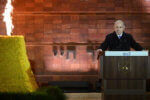Although Steve and Deborah’s time in the Philippines eventually extended from one month to three months to 28 years, the urgency to empower ordinary believers to make disciples never left the DNA of Victory. Today the leadership team still seeks to obey Jesus’ call to make disciples by engaging culture and community, establishing biblical foundations, equipping believers to minister, and empowering disciples to make disciples—what’s known at Victory as the “Four E’s” of discipleship.
That explains why Victory’s pastors get more excited about the number of baptisms last year (4,613) or current discipleship groups (5,009) than they do congregation size (62,000).
“I am tired of watching sincerely dedicated pastors and church planters focus on things that ultimately don’t matter and on things that don’t transform lives,” Murrell says. “Anyone concerned with growth will eventually have to deal with numbers. The trick is to figure out which numbers really matter and which numbers don’t.”
Indeed, given the assortment of “mega” stats Victory could brag about in this season of remarkable growth, it’s hard not to fall into the “numbers game” trap. Yet aside from those stats the church’s leadership sets as priority, a few others are still worth noting—and certainly matter to Murrell, Bonifacio and the entire team:
351—For the 351 underprivileged high school and college students across the Philippines whose lives have been radically changed by the church’s Real LIFE Foundation since 2007, no numbers can reveal the full story. The foundation was launched out of Victory in 2003 by Dr. Joey Castro, a physician and pastor who dreamed of providing scholarships to poor students who, if not for assistance, would otherwise have no chance to obtain a university degree. Real LIFE began in the squatter community near Rizal High School (a 24,000-student high school that the Guinness Book of World Records called “the world’s largest” at the time), and has since expanded to include programs in 22 cities for coaching, leadership training, community development and even emergency relief.
2,252—As of June, 2,252 discipleship groups (called “Victory groups”) met outside the metro Manila area, proving that Victory’s discipleship model isn’t just for urbanites. The church recently added seven more church plants, bringing its total outside the bustling city to 56.
330—Victory currently has discipleship groups established on 330 high school and college campuses throughout the Philippines, including an astounding 100-plus in the metro Manila area alone.
120—Through its School of World Missions, Victory has trained and sent Filipino cross-cultural missionaries all over Asia and the world, resulting in more than 120 churches planted in Asia and the Middle East. Some Victory church-planters have gone as far as Sydney, St. Petersburg, Madrid, Dubai and San Francisco.
The Faceless Church
In the U.S., a single “celebrity” pastor typically serves as the face of the nation’s largest megachurches—renowned leaders such as Joel Osteen, T.D. Jakes, Ed Young, Rick Warren, Andy Stanley or Bill Hybels. Yet if you were to ask anyone in Manila, “Who’s church is Victory?” you’d get a variety of answers.
In the evangelical world, many would say Manny Carlos, who is Victory’s representative on the Philippine Council of Evangelical Churches (PCEC). In the business world, they might say Bonifacio, given his business background and his central business district congregation. In the squatter areas around Rizal High School, they would undoubtedly say Castro, who served the community for years as the pastor of Victory Pasig. In the ultra-marathoner community, they would say Ferdie Cabiling, who is the pastor of Victory Ortigas and runs more miles in one race than most do in an entire year. And in Manila’s University Belt, where the church started in 1984, they would likely say Gilbert Foliente, who leads Victory U-Belt, a congregation with thousands of high school and college students.
So who’s church is it anyway? For Victory—which doesn’t even post the names of its lead pastors on its various church websites—that’s an easy answer.
“Our job is to make disciples,” Murrell often says. “Jesus said He will be the one to build His church.”
It’s a typical statement from a man whose blog is fittingly titled “The Reluctant Leader” and who can walk through a Victory parking lot unrecognized by attendees. Because he never planned on staying long-term, Murrell didn’t want to build the church around himself. Rather, his strategy was to equip and empower local leaders who’d take the church farther than an “accidental missionary” ever could. And pastors such as Bonifacio are living proof this strategy continues to work.
————————————————-
It’s 11:30 a.m. The 10 a.m. service has ended and the ushers are setting up for the noon service. Bonifacio stands outside speaking with people leaving the 10 a.m. service for lunch. He looks across the atrium to the tables and notices that the group of students from the University of Makati are gone. They’ve been replaced by seven more discipleship groups, gathered around the same tables, discussing and applying the word they’ve just heard preached.
He smiles, greets a few more people and prepares himself to preach the 12 p.m. service—the second-most important meeting of the hour.
William Murrell was born and raised in the Philippines. He attended college in Nashville, Tenn., got his first job in France, went to graduate school in the U.K. and is now pursuing a Ph.D. at Vanderbilt University.
To win a copy of Joey Bonifacio’s new book The Lego Principle click here.









Leave a Comment
You must be logged in to post a comment.